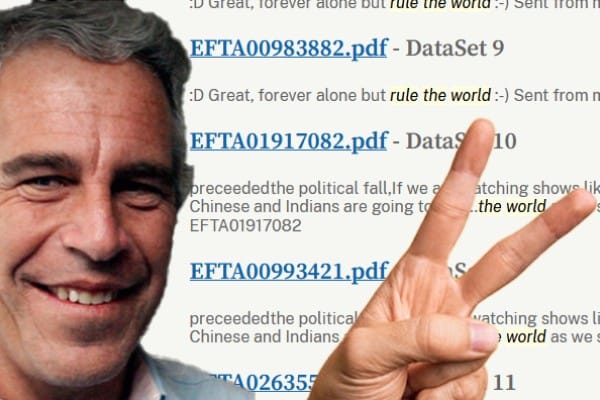The Tech-Right's War on Independent Journalism
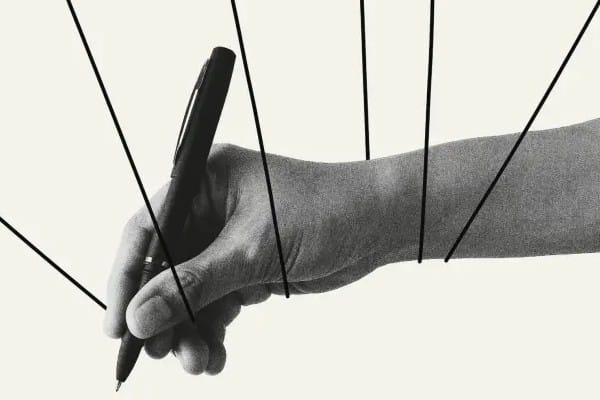
Last week I saw journalist Matt Taibbi launch himself face-first into the most embarrassingly incorrect and state-sycophantic take I’ve ever seen from him, and it inspired me to pick up a book that had been sitting in a pile next to me for a while now. It was on my list to read but this incident made it skip the queue.
I’ve bought a whole bunch of books recently, mostly to assist in research for my own book, and I thought it might be a cool idea to review some of the good ones. It will hopefully be a novel departure from just another naked rant about Matt Taibbi.
The book is Owned: How Tech Billionaires on the Right Bought the Loudest Voices on the Left, by Eoin Higgins. I was reminded I had it when Taibbi, one of the book’s main subjects, started going off on Twitter, making not-quite-veiled threats that he’s going to sue Higgins over its subtitle.

He can’t actually sue, of course, because any lawyer he hired would, you know, read the book, where they would quickly locate the meaning of this subtitle—the book’s main thesis—within the first few pages of the introduction: Higgins does not claim that either Taibbi or the book’s second main character, Glenn Greenwald, have taken money from billionaires. It is rather that right-wing billionaires bought the media platforms that these journalists rely on for their survival.
That isn’t an opinion; It’s a verified fact. But Taibbi isn’t illiterate, just deliberately obtuse. It’s not even the most glaring example of Taibbi’s abdication of integrity this month. The incident that I led with was his recent foray into broadcasting state propaganda—the Trump administration’s obvious and sloppy attempt to cover from scandals like the Epstein thing by grabbing MAGA by both ears and trying to force them to focus entirely on Trump’s personal enemies.
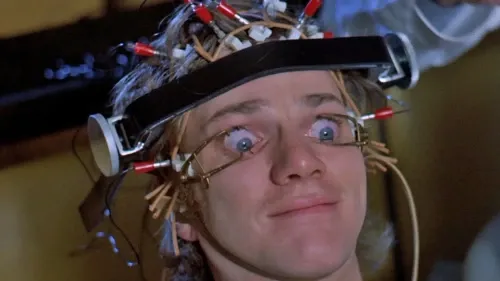
What happened is Tulsi Gabbard, six months into her job as Director of National Intelligence, suddenly discovered she had some documents showing that the intelligence community were aware since the start of Trump’s first term in 2017 that the Russian government never made any attempt to influence or meddle in the 2016 election, and thus anybody in the government who ever suggested otherwise, up to and including Obama (especially Obama) has committed high treason.
The drum beat of the administration ever since has been an open call to strap on the blinkers and refocus his base’s attention away from the scandals that are currently obliterating his ratings and onto the MAGA fever dream that they are finally going to imprison or execute every Democrat whose name isn’t John Fetterman.
Matt Taibbi has been enthusiastically and uncritically signal boosting Gabbard’s claims, which is stark raving nuts, because the deceptive wording and sloppy, rushed, urgent state propagandistic nature should be obvious to a grade school reading comprehension student, let alone a famous award winning journalist. If you’re interested in what Matt got horribly wrong about this story, Ben Cohen does a pretty comprehensive explainer here.
Eoin Higgins’ Owned explains what the hell happened here—how Matt Taibbi, a journalist who earned his popularity skewering Goldman Sachs and sympathizing with Eric Garner, wound up voting for and carrying an Olympic swimming pool worth of water for President Donald Trump, a man who would dig Garner up if it meant he could kill him again. How Glenn Greenwald, who once jointly won the Pulitzer for his reporting on Edward Snowden ended up a Fox News darling, an ally of Chaya Raichek, and a personal friend of Tucker Carlson and Alex Jones.

I wasn’t familiar with Higgins’ work outside of this book, but I did note that he made Freddie DeBoer’s hit list of white men he can’t stand because they’re too anti-male and too anti-white. DeBoer recently told me in a comment that I’m on this list as well for my crime of taking Taylor Lorenz’s side in the demented years-long harassment campaign levied against her by Marc Andreessen. Serendipitously, this is also mentioned in Higgins’ book, and for good reason—it’s not really a story about Taibbi and Greenwald at all. They are the framing device. The bigger story here is the long game of right-wing tech oligarchs to seize ideological control of the media, either by bringing journalists to heel, or, in Lorenz’s case, destroying them.
Being too woke for Freddie isn’t the only thing we have in common. I’m fascinated by the etiology of ideas. Neither Greenwald nor Taibbi were puppeteered into holding the positions they now express. They weren’t bribed or blackmailed. They came to it willingly. The role that the tech oligarchs played in leading them to the right was less carrot-and-stick and more like what those people with brooms are doing in the sport of curling.

Some of the blame can laid on a shitty attitude, some on their temperament, and yes, some failings of the left, such as with the aforementioned Russia debacle.
Both Taibbi and Greenwald, in the midst of their most rightward pivot, became extremely frustrated with the media’s handling of Russia’s involvement with the 2016 election and the absurdity it ballooned into. To be clear, it’s well established that Russia was very involved in trying to steer that election to Trump, most prominently with the DNC email hacks. It’s unlikely the outcome would have been different without their efforts, and a lot of the more fanciful stories of direct collusion between Russia and the Trump campaign range between unlikely and insane (miss me with that pee tape bullshit). As an entertainment writer for Cracked during that whole thing, I probably bear some responsibility.
The attempts of Taibbi and Greenwald to bring people back to Earth about Trump-Russia were interpreted by many on the left as Trump support, and they were ostracized for it, furthering their journey of “leaving the left.” In Taibbi’s case, it turned into a self-fulfilling prophecy, and he became a Trump supporter, after being subjected to the added indignity of what many argue was an unjust #MeToo campaign.
Eoin Higgins ably walks the tightrope of documenting these events as an explanation but not an excuse. Taibbi and Greenwald aren’t victims, but they aren’t the villains, either. The true villains—Peter Thiel, Marc Andreessen, Elon Musk, and other billionaire movers within the far right tech sphere—can’t be understood so easily by breaking their lives down into a series of events and an evolution of worldviews. Theirs is a simpler story, one of the corrupting nature of power and wealth.
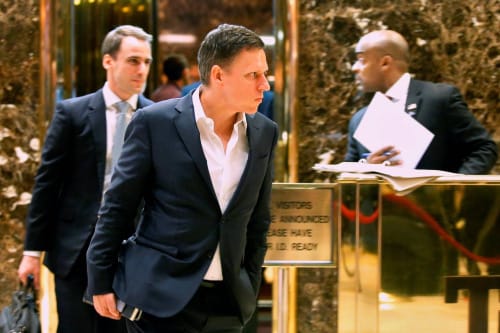
For all the broad similarities in their journeys, Higgins illustrates clearly that these are all very different people. Greenwald is the most fleshed out figure in the book (you might even say that he’s its anti-hero) owing to his accessibility. Higgins and Greenwald are acquainted, having both worked for the same news outlet, The Intercept, and having crossed paths professionally numerous times, but despite this, both author and subject display laudable integrity—Higgins, by not pulling his punches, and Greenwald, by being an open book despite knowing that the project isn’t going to present him in a positive light. Sections dealing with him are given body and weight with excerpts of interviews conducted by the author.
Taibbi is a much more abrasive figure, whose story can only be assembled from public information and scant interviews with people he has worked with. His only direct contact with the author for this book consisted of two words (they’re not “fuck you,” but that’s close).
It strikes me that Greenwald and Taibbi are closer, personality-wise, to the tech billionaires than they are to each other, and Higgins paints a clear and distinct picture of these men also. Greenwald and Peter Thiel are less mercurial and more open and confident in themselves and what they believe. Taibbi, on the other hand, is a course hybrid of Marc Andreessen and Elon Musk.
Both of these oligarchs are phenomenally thin-skinned and completely closed to even implied criticism. Andreessen, somewhat notoriously, is a prolific Twitter-blocker. Musk and Taibbi both share a trait in which they will not participate in an interview if they’re not certain it will be friendly, and each has one notable exception under their belt: For Musk, an embarrassing interview with Don Lemon in which he lost his temper struggling to answer for his racism and the definition of wokeness. For Taibbi, a humiliating appearance on Mehdi Hasan’s show in which the reporter demolished the credibility of the Twitter Files.
I think what ties all of these men together in a more direct way—and I mean all of them, the reporters and the oligarchs—is the dangerous transformative effect of the media echo chamber.
It has long been observed that Elon Musk was “redpilled” by Twitter. I don’t think he was ever left-of-center (if he was, the effect may have worked in the opposite direction), but the speed at which he rocketed (mind the pun) toward fascism in probably fewer than 10 years can only be explained by the feedback loop of sycophantic worship awarded to him by social media. Musk’s drug addictions are well documented but I don’t think any of them reach the height of the dopamine whack he gets from social media, an addiction so intense that he literally bought the factory to get high off his own supply. Every time he says anything on Twitter, Musk gets hundreds of thousands of replies that look like this:

In the social media era, ordinary people are awarded direct access to public figures in a way that is unprecedented in human history. But there’s a very “stare into the void, the void stares back at you” effect inherent to this—public figures, including journalists, have unprecedented access to their audiences. The dopamine effect of this is stronger and more deranging than many would like to admit. Some, like Andreessen and Musk, curate it aggressively. Others, like Taibbi, seem to fall into it gently. Some recognize it on a level and make some effort to resist—in Owned, Higgins recounts an anecdote in which Glenn Greenwald has his husband withhold his phone from him to resist engaging in internet arguments.
To reiterate, Eoin Higgins’ thesis in Owned is not so banal and simplistic as to suggest, as Taibbi assumes he does, that billionaires are paying off journalists. There are layers of “ownership” involved in this story: Billionaire ideologues like Peter Thiel, Marc Andreessen, and Elon Musk are aware of the power of owning platforms to gain the ability to adjust the political environment of those platforms. Their project (some of which they admit outright and the rest we can deduce) is to drain the power of the traditional media (which they have successfully baited the mainstream into derogatorily calling the “legacy” media) into pockets of algorithmically guided platforms that they personally control. Platforms like Twitter, Rumble, and Substack, the attraction to each of which is their ostensible commitment to free speech—which often turns out to be far less free in reality than it says on the tin.
But, once captured by these platforms, journalists are in turn owned by their new audience. Imagine the dopamine thrill that Matt Taibbi receives when he regurgitates Tulsi Gabbard’s CIA propaganda in his own words and receives dozens of messages like this:

Imagine the bloodthirst it stirs up when your replies are filled with people calling for the execution of the people who doubted you.
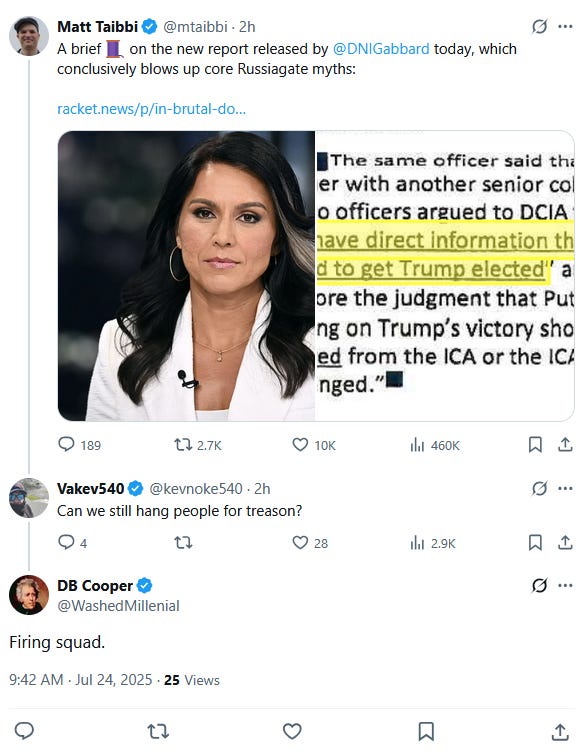
These concentrated personality cults can even be aimed and fired like a weapon, if you know how to wield it. Taibbi in particular only ever interacts with people on social media by so-called “quote-dunking”—rather than ever reply to criticism directly, reposting it so that he can invite his entire audience to respond, and if the mood lands just right, spark a harassment campaign against the critic to discourage them from speaking out again. To bring us full circle, here’s what Eoin Higgins’ Twitter replies have looked like for days after Taibbi threatened to sue him over a book that neither he, nor any of these people, have read:

Though Taibbi and Greenwald are the focus subjects, they are not unique cases in the greater thesis of Owned, which stands as a warning to be critical of the new phase of the so-called independent media. It all runs on platforms, and the platforms are all owned by somebody.
This is an entirely unsolicited review. I just wanted to do this to experiment in a genre of writing—a book review—that I haven’t tried before. But I wouldn’t do this for a book that I didn’t genuinely recommend, and I do recommend this for any of my readers who are interested in the tech oligarchs taking over the media stuff I’m always writing about. You can buy the book from Hachette here:
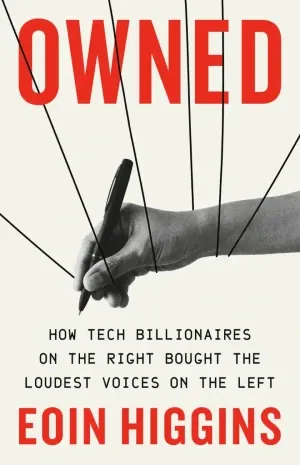
As always I want to mention that the reason I came upon Eoin’s book in the first place is that I’m researching and writing a book of my own, which is a deep dive into how geek internet culture over the past 30 years has dramatically transformed Western culture and helped pivot it toward the right. The working title is How Geeks Ate the World and I’m going to be dropping parts of the draft into this very newsletter as the project comes along—but only for paid subscribers. So if you want to read along in real time, please consider subscribing. Otherwise I’ll be keeping you in the loop. Check it out here:






